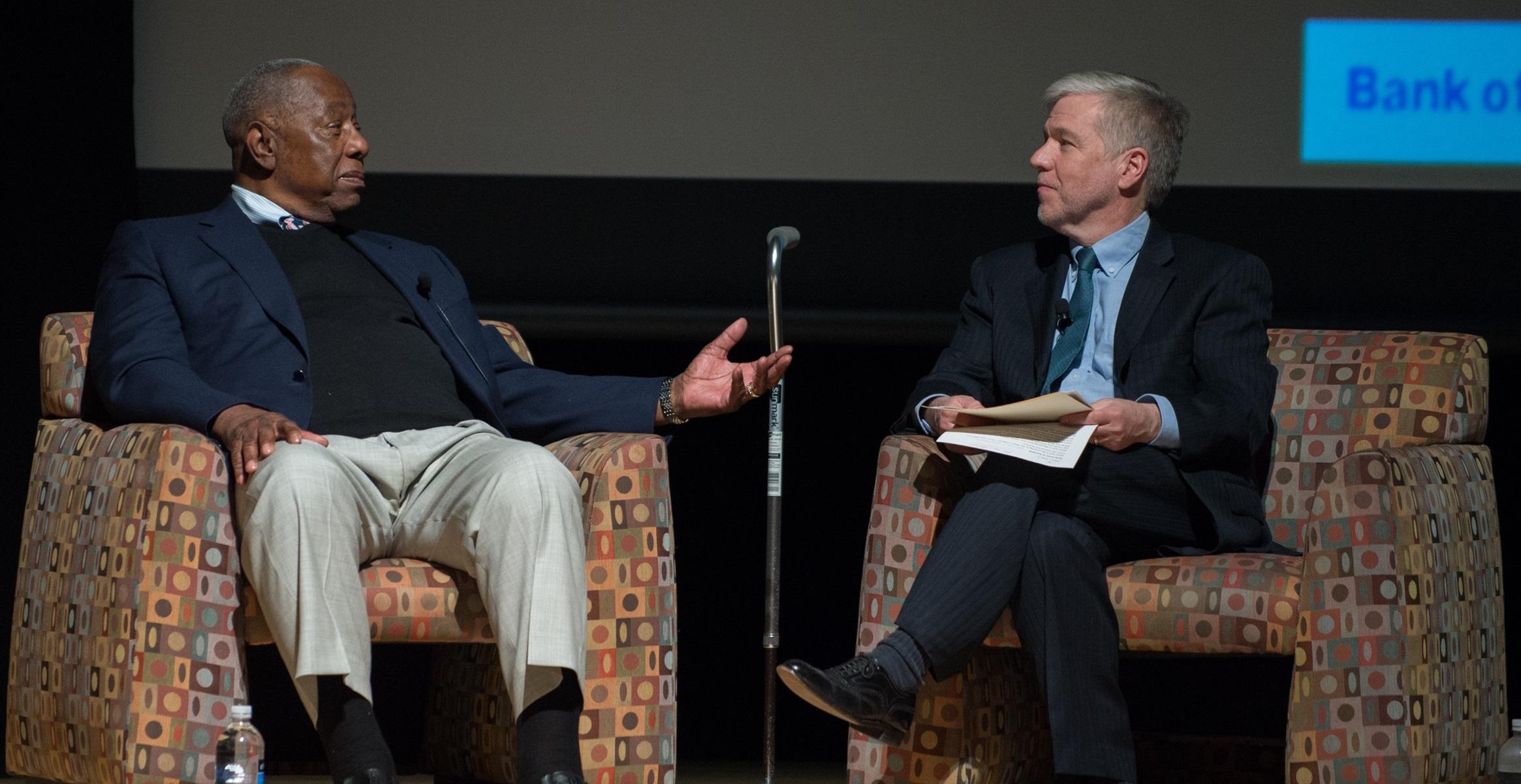Hank Aaron On Chasing Babe Ruth: ‘The Saddest 2 1/2 Years I Ever Had’

Hank Aaron at the Rialto Center for the Arts in downtown Atlanta, Ga. April 6, 2016. © 2016 Bita Honarvar
Bita Honarvar / Atlanta Event Photography
The racism and abuse Hall of Famer Hank Aaron endured while chasing the home run record of Babe Ruth was so traumatic he almost regrets the accomplishment many consider one of the greatest feats in sports history.
“I didn’t have too much fun,” the former Atlanta Braves slugger said. “It was the saddest 2 1/2 years I ever had in baseball. Knowing what I know now, I don’t know that I would do it again.”
Aaron was speaking about his own experience in Major League Baseball’s history as part of a PBA30 special presentation of Ken Burns’ documentary on Jackie Robinson, who broke baseball’s color barrier in 1947.
http://www.pba.org/jackierobinson
The Bittersweet Home Run Chase
There were the repeated threats from people who did not want an African-American athlete to break Ruth’s home run record. Aaron revealed that he was not allowed to stay in the same hotel as his teammates during the home run chase, out of safety concerns.
“I did not dare go out in the streets to eat. I had to be escorted out of the ballpark. I got all kinds of threatening letters from different people.” Aaron said. “So I had all of these things to worry about.”
Even his children felt the racism and threats against their father. “I had one daughter at Fisk University and she dare not go off campus. My two boys, who both went to Marist, had to be back and forth to school as if they were presidential kids.”
Jackie Robinson’s Impact, On And Off The Field
Aaron spoke extensively with WABE 90.1 host Denis O’Hayer of his friendship with Jackie Robinson, who arrived in Major League Baseball seven years before Aaron did.
Aaron was born in Mobile, Alabama, and grew up in the segregated South. Back then, “There weren’t too many things that a black man could do,” he said. “When I was a little boy, you had to be a school teacher or play sports. Those were the only two things that you could do – the world just wasn’t open for anything else for you to do.”
But Robinson gave him hope to become a professional ballplayer. “He inspired many blacks. And he gave all of us an opportunity. Jackie showed them that if you give me a chance to play baseball, I can play the game as well as anybody. And that’s what I was inspired by, mostly by him,” Aaron said.
Once Aaron followed that dream, he got to meet the legend. “Jackie and I talked quite often before he died. I respected him not only for his baseball knowledge but for what he meant to me as a man off the field, what he was able to do. He was always concerned with other people,” Aaron said.
When it came to baseball, “Hammerin’ Hank” said Robinson taught him how to control the tempo of the game.
“You know, as much talent as I have, the one thing he wanted to see me do more was he wanted me to run the bases a bit more, stealing more. Because he was a daredevil on the base paths.”
In Aaron’s first five years in baseball, he never stole more than five bases. After Robinson’s pep talk, Aaron became a feared base runner, stealing a career high 31 bases in the 1963 season.
Confronting Racism, One Home Run At A Time
Throughout their careers, Aaron and Robinson experienced many of the same bouts with racism.
“I didn’t have any trouble on the baseball field. On the field itself, playing the game was probably as easy for me as anything,” Aaron said. “But the other things that came with it was kind of hard for me to digest. I had some tough times. I had the same kind of things that Jackie had to digest.”
For Aaron, that was particularly true during his year and a half in the minor leagues.
“It was tougher in the South Atlantic League for me than it was in the big leagues. I had a rough time. In Jacksonville, I led the league in everything except hotel accommodations. They wouldn’t let me do anything. I couldn’t stay with my teammates; we stayed in private homes. We didn’t travel with our teammates – we had to travel by ourselves,” he said.
Like Robinson, Aaron was subjected to repeated beatings from white pitchers who wanted to knock him out of the sport.
“There as a player who was about as tough as he could be on me. His name was Corky Valentine, and every time I would go to the plate he would find a spot on my neck or my back or someplace, and he would drill me,” Aaron recalled.
Aaron knew he could not strike back. But the man many still consider the home run king said he knew how he could get revenge.
“It just so happened that (Valentine) and I got to the big leagues at the same time. He was in the Cincinnati organization, and the very first pitch he threw to me in Cincy I hit out of the ballpark.”
‘We Still Have Some Ways To Go’
As Robinson’s career progressed, he became more outspoken about racial injustice.
As Aaron puts it, “Jackie had gotten to the point where he just wasn’t going to accept ‘had been.’ He said, ‘I’ve shown people what I can do now. I need to be treated like a person.’”
And this extended into Robinson’s push for more African-American managers and front-office personnel.
“He said somewhere along the line, baseball has got to understand that if given the opportunity, we can do anything anybody else can do in this game, including coaching, including managing and being general managers,” Aaron said.
Major League Baseball now honors Robinson every April 15 to commemorate the day when he made his Major League debut. But Aaron thinks, “If you should ask Jackie if he was alive today, he would be very disappointed in the way that Major League Baseball has operated so far.”
Aaron himself has been a part of the Atlanta Braves’ front office since 1976. “I’ve been involved in baseball ever since I got off the field, and I too have been somewhat disappointed in some of the things that baseball has done for African-Americans. To be honest with you, we still have some ways to go.”
To see more of Hank Aaron’s comments about race, Jackie Robinson and the state of baseball today, tune in to PBA30’s special presentation of Ken Burns’ documentary on Jackie Robinson on Thursday, April 28, at 8 p.m. http://www.pba.org/jackierobinson
WABE 90.1’s “Closer Look” will also play an extended audio version of the interview at 1:30 p.m. on Thursday, April 28. http://news.wabe.org/programs/closer-look-rose-scott-and-jim-burress
9(MDAxODM0MDY4MDEyMTY4NDA3MzI3YjkzMw004))








